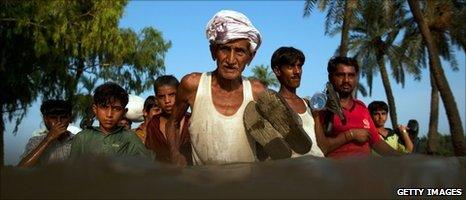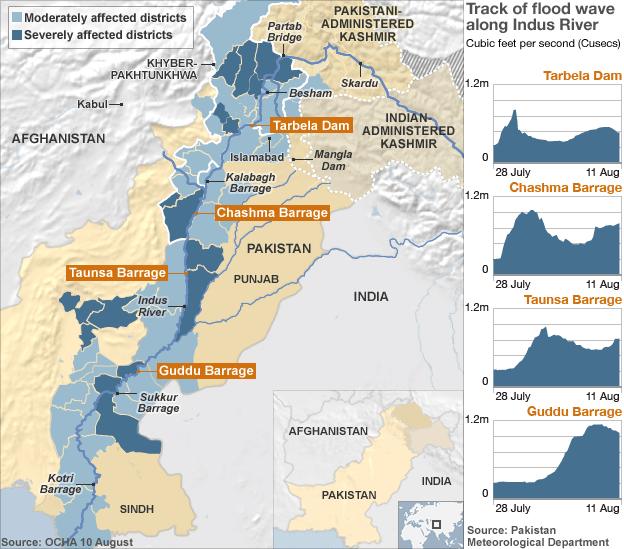Pakistani president visits flood relief camp in Sindh
- Published

A third of Pakistan has been affected by the floods, says the UN
Pakistani President Asif Ali Zardari has visited a relief camp for flood victims, in his first visit to areas hit by the deluge.
The trip follows criticism of his recent tour abroad and of the perceived slow government response to the country's worst humanitarian crisis.
A spokesman said the president handed out aid in Sindh province, and promised homes would be rebuilt.
The floods have affected 14 million people and left at least 1,600 dead.
"The president visited a relief camp set up for flood-affected people at a college in Sukkur city," his spokesman, Farhatullah Babar, told the BBC.
"He heard people's grievances and told them that the government was determined to improve their situation as quickly as possible."
The president had told the displaced that the government would "see to it that your houses are rebuilt as early as possible", according to Mr Babar.
"He distributed relief goods among the families housed at the camp," the spokesman added.
Mr Zardari also inspected the Sukkur Barrage, a key flood barrier in Sindh, which has been under pressure from the massive volume of floodwaters flowing down the Indus river.
President Zardari was briefed on the flooding in Sukkur Barrage
The BBC's M Ilyas Khan, in Islamabad, says it is not often that Mr Zardari, who is the widower of assassinated former Prime Minister Benazir Bhutto, makes public appearances.
With Pakistan facing a fierce insurgency by Islamist militants, the president's visit was kept low-key and his schedule was not disclosed in advance, our correspondent says.
The official Pakistan Television Corporation only showed brief footage of Mr Zardari at the flood barrier, and of him visiting a camp for 2,500 displaced people at a women's college in Sukkur.
Mr Zardari was bitterly condemned at home this month for setting off on visits to the UK and France as the floods were beginning.
While the military's relief efforts have been praised, victims of the disaster have lashed out at the government's response, and some politicians visiting flood-affected areas have come under physical attack.
The deluge has caused extensive damage to key crops - such as wheat, cotton and sugar cane - in a country where agriculture is an economic lynch-pin.
Food and Agriculture Minister Nazar Muhammad Gondal told the BBC the disaster had caused "huge losses" to its crops.
From Pakistan's northern mountains to its southern plains, the floods have washed away roads, bridges and railway, while entire villages have been rubbed out and countless livestock drowned.
Punjab Governor Salmaan Taseer told the BBC's Lyse Doucet that a total of $2-3bn worth of crops had been destroyed in the province including 650,000 acres of cotton and rice, maize and other cash crops.
He said that the floods had hit the poorest part of Punjab, which were "a breeding ground for potential recruitment" by militants.
"It is very important that the international community comes to their aid," he said, "because this is the kind of nest which can grow the vipers."
Aid stepped up
The UN has launched an appeal for more than $450m (£290m) to help those affected.
The EU says it is also stepping up aid for Pakistan's flood victims. An extra 10m euros (£8.3m) of aid was announced on Wednesday, in addition to 30m euros that was announced earlier.
How a tragedy unfolded in Pakistan
Earlier, a senior Pakistani envoy suggested recent comments by UK Prime Minister David Cameron about the country exporting terrorism were deterring the public from donating to the flood relief appeal.
Mr Cameron angered Islamabad during a visit last month to regional rival India, when he accused elements in Pakistan of looking both ways on militancy.
Pakistan's permanent representative to the UN, Abdullah Hussain Haroon, told BBC's Radio 4: "Pakistan has suffered because of what Mr Cameron has said, because the British people will listen to their prime minister."
Meanwhile, Islamabad's UK envoy, Wajid Hasan, denied claims by Transparency International that most of the money given to the Pakistani government in the past for flood defences had been lost to corruption.
BBC Urdu will transmit six daily bulletins in Urdu and Pashto providing vital information including how to stay safe, avoid disease and access aid. Special programmes will be broadcast each day in Urdu at 12.30, 15.30 and 18.30 and in Pashto at 12.45, 15.45 and 18.45 (local times).
